As a devoted pet parent, ensuring your furry companion’s well-being is paramount. Recognizing your pup as an integral part of your family and prioritizing their optimal health is non-negotiable.
Surprisingly, the food you choose for your canine companion may inadvertently compromise their well-being. Certain mainstream dog food varieties harbor detrimental additives, potentially inducing digestive distress or aggravating allergies.
To navigate this nutritional minefield, the ASPCA furnishes comprehensive guides, elucidating best practices for canine nutrition. However, opting for a more straightforward solution, such as limited ingredient dog food, can offer tangible benefits. In the following discourse, we’ll delineate the defining characteristics of limited ingredient dog food and spotlight exemplary brands worth considering.
What are limited ingredient dog foods?
These specialized diets are crafted with a simple yet effective formula to alleviate pet food allergies. Typically comprising a single source of high-quality protein alongside a concise selection of fruits, vegetables, and carbohydrates, these diets offer a streamlined solution to mitigate allergic reactions and digestive concerns.
1.Limited ingredient dog food VS. grain-free dog food
Limited ingredient dog foods may offer grain-free and grain-inclusive options; nevertheless, it’s essential to note that not all dog foods qualify as a limited ingredient.
While all grain-free dog foods eliminate grains from their formulations, specific grain-free recipes may still include other ingredients that could trigger allergies or sensitivities in particular dogs.
2.Benefits of limited ingredient dog food
Limited ingredient dog food is a go-to choice for dogs grappling with allergies, sensitivities, or intolerances. Its streamlined formulation curtails the likelihood of adverse reactions, offering a more manageable solution for pet owners. Furthermore, the simplicity of its ingredients facilitates the identification of potential triggers, aiding in targeted dietary adjustments.
Moreover, limited ingredient dog food frequently incorporates a premium, natural ingredients, thereby bolstering a dog’s overall well-being.
Best Limited Ingredient Dog Food
KOHA Limited Ingredient Dog Food

KOHA Limited Ingredient Dog Food
KOHA offers a diverse range of dog food products, including Minimal Ingredient Stew, Pure Shreds for Dogs, Slow Cooked Stews, Freeze-Dried Raw Bites, Freeze-Dried Raw Toppers, Dehydrated Mixes, and Treats.
These options provide flavorful and nutritious choices for your pet’s varied dietary needs.
Pros
Single meat per recipe reduces allergy risks
High meat content (up to 90%) supports lean muscle
Avoids fillers for weight management
No preservatives or artificial additives
Includes New Zealand Green Mussels for joint health
Cons
Currently, US shipping only
KOHA’s Limited Ingredient Dog Food is meticulously crafted to ensure digestibility and gentleness in your pet’s digestive system. Each distinctive recipe boasts a single meat source, catering to dogs with severe food sensitivities or digestive concerns. With an array of irresistible flavors such as duck, beef, lamb, turkey, salmon, and pork, mealtime will become a joyful anticipation for your furry companion.
Free from undesirable fillers like potatoes, wheat, corn, soy, and carrageenan, you can confidently feed your dog, knowing their sensitive stomachs are well-cared for.
Natural Balance Limited Ingredient Grain-Free Dog Food
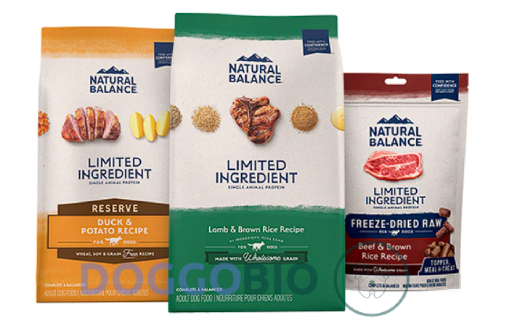
Natural Balance Limited Ingredient Grain-Free Dog Food
Natural Balance offers a wide selection of dog food products, including Original Ultra Dry Dog Food, Freeze-Dried Toppers, and Wet Food variations like Fat Dogs for overweight pets and Platefuls cooked in bone broth.
Additionally, they provide dog treats such as Crunchy Biscuits, Mini Rewards, and Jumpin’ Stix.
Pros
Single protein options
Diverse meals for different breed sizes and ages
Backed by research-driven recipes
Cons
It contains filler ingredients like potato and oats
Some products may not be suitable for pets with specific protein allergies.
Natural Balance strives to provide balanced nutrition for all dogs, catering to those with and without food sensitivities. Their limited-ingredient recipes prioritize single-source animal proteins and carbohydrates. Pet owners can select from various options, including wet or dry meals, treats, toppers, and biscuits.
Blue Buffalo Basics Limited Ingredient Diet (Skin & Stomach Care)
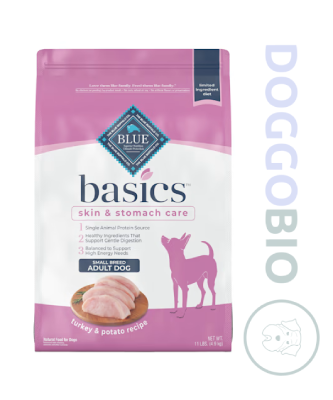
Blue Buffalo Basics Limited Ingredient Diet (Skin & Stomach Care)
Blue Buffalo offers diverse dog food lines, including Blue Life Protection Formula, Blue Wilderness, Blue True Solutions, Blue Freedom, Blue Natural Veterinary Diet, and Baby Blue.
Pros
Specific formulations for adult, small breed, large breed, senior, and puppy dogs
Single protein source recipes
Free from corn, wheat, soy, artificial flavors, or preservatives
Cons
All limited-ingredient recipes contain potatoes.
Some filler-type ingredients, like oats, are included in their ingredients list.
Specific recipes feature controversial ingredients such as pea fiber, protein, and dried yeast.
Blue Buffalo prioritizes pet foods tailored to address food sensitivities. Their BLUE Basics line is meticulously crafted to support gentle digestion. Their dry or wet varieties offerings cater to various breeds, ages, and dietary requirements. They offer flavors such as salmon in gravy, duck & potato, turkey & potato, whitefish & potato, and more.
Hill’s Science Diet Small Bites Chicken Recipe Dry Dog Food
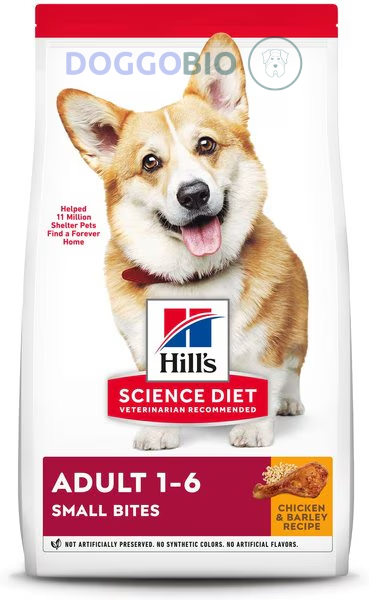
Hill’s Science Diet Small Bites Chicken Recipe Dry Dog Food
Hill’s Science also offers a Science Diet, comprising a variety of dry and wet treats and foods, as well as a Prescription Diet, available exclusively by veterinary prescription.
Pros
Rich in Omega 6s and Vitamin E
It contains fiber to support digestive health
Chicken protein is the primary ingredient
Cons
Not soy or grain-free
Contains filler ingredients such as barley, wheat, corn, and sorghum
As part of the Colgate-Palmolive family, Hill’s Science leverages the manufacturing capabilities of a large corporation to offer a diverse array of food options. This dry food formulation boasts ease of digestion as its primary feature, distinguished by its smaller kibble size.
Natural Balance Limited Ingredient Grain-Free Dog Food for Small Breeds
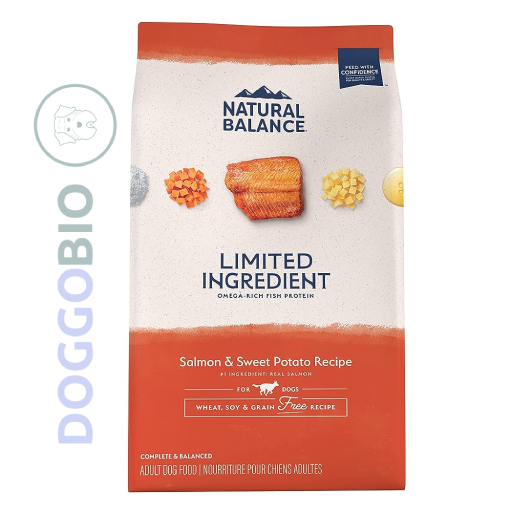
Natural Balance Limited Ingredient Grain-Free Dog Food for Small Breeds
Natural Balance also offers Original Ultra Dry Dog Food in various flavors, including grain-free options, Freeze-Dried Toppers in two flavors, Wet Food selections such as Fat Dogs for overweight pets, Platefuls cooked in bone broth, and Delectable Delights for meal or topping usage.
Additionally, they provide dog treats like Crunchy Biscuits, Mini Rewards, and Jumpin’ Stix.
Pros
Diverse protein offerings
Small kibble size suitable for little jaws and teeth
Most recipes feature a single meat source
Cons
All recipes contain potatoes, serving as filler ingredients
Chicken meal products may trigger adverse reactions in dogs with sensitivity issues
Natural Balance introduces specialized formulations for small breeds, expanding their limited diet range. These options encompass grain-free salmon & sweet potato, grain-free chicken & sweet potato, lamb & brown rice, vegetarian with vegetable broth, grain-free duck & potato, and more.
Instinct Limited Ingredient Diet Grain-Free Recipe
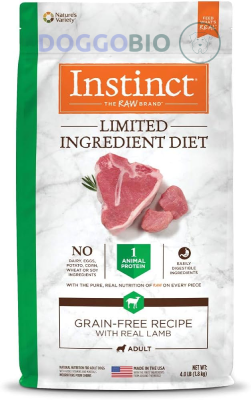
Instinct Limited Ingredient Diet Grain-Free Recipe
Instinct also provides frozen raw meals, freeze-dried raw meals, raw kibble, raw toppers, and raw coated kibble.
Pros
Features one animal protein and one vegetable
Free from artificial colors, preservatives, corn, dairy, eggs, potato, soy, or wheat
Cons
It contains peas and pea protein, lacking nutritional value
The salmon recipe is not single meat and includes cod
Instinct stands out as a raw food brand, offering minimally processed, high-protein, and uncooked options. Their menu spans from 100% raw frozen or freeze-dried meals to 20% raw kibble, toppings, and raw-inspired wet food choices. Flavor profiles encompass chicken, beef, rabbit, lamb, beef & cod, and pollock.
Royal Canin Veterinary Diet Hydrolyzed Protein
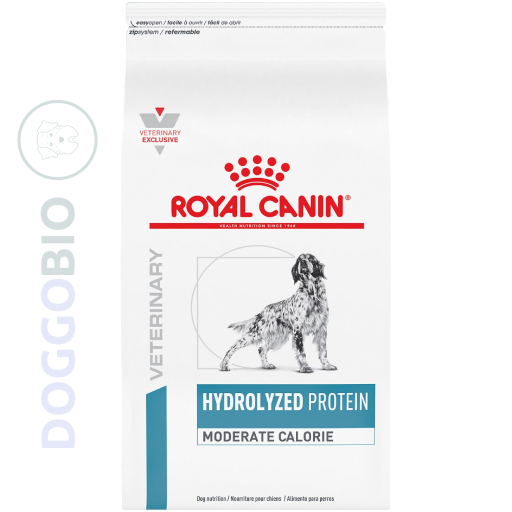
Royal Canin Veterinary Diet Hydrolyzed Protein
Royal Canin provides an extensive selection of dog food products, including options for mature dogs, veterinarians, and breeders.
Pros
Developed by veterinarians as a therapeutic diet
Rich in omega-3 fatty acids
It targets the regulation of intestinal transit and promotes healthy digestive flora.
Cons
Protein is not the primary listed ingredient.
It contains a controversial ingredient, hydrolyzed soy protein, potentially leading to adverse effects.
Originating over 50 years ago in France, Royal Canin traces its roots to a veterinarian’s creation of his signature “yellow soup” for dogs. Today, it operates under the MARS food manufacturing corporation, offering a diverse range of dog foods distributed globally.
Purina Pro Plan Veterinary Diets
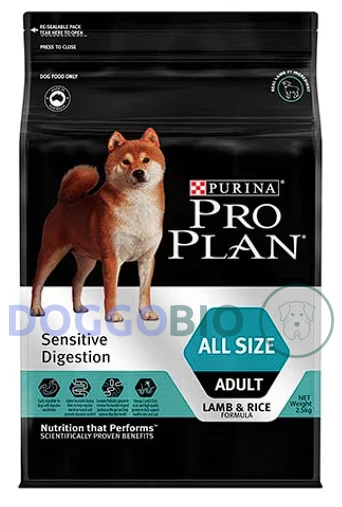
Purina Pro Plan Veterinary Diets
Purina Pro Plan Veterinary Diets offer a specialized range to aid veterinarians in managing pets with various health conditions.
Each diet undergoes meticulous development by Purina’s nutritionists, scientists, and veterinarians, ensuring precise nutrient profiles.
Pros
Developed by a team of nutritionists, scientists, and veterinarians
Contains only one carbohydrate in the ingredient list
Highly digestible formulation promotes nutrient absorption
Cons
Requires a veterinarian prescription for purchase
Lacks meat-based protein content
Predominantly comprises corn starch, potentially contributing to weight gain over time.
Purina Pro Plan Veterinary Diets extend to Critical Nutrition, Gastroenteric Formula, Kidney Function Canine Formula, Overweight Management Canine Formula, and Veterinary Supplements such as Canine Calming Care and Canine Fortiflora.
Hill’s Science Diet Sensitive Skin and Stomach Adult
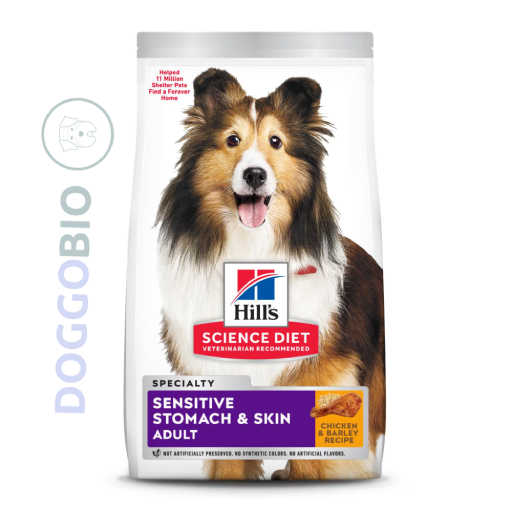
Hill’s Science Diet Sensitive Skin and Stomach Adult
Hill’s Science Diet also offers a variety of dry and wet treats and foods under the Science Diet line, as well as Prescription Diet products available exclusively by veterinary prescription.
Pros
Available in various sizes suitable for both small and large dogs
Enriched with skin-healthy vitamin E and Omega 6 fatty acids
Chicken is the leading ingredient on the list
Cons
It contains a notable amount of fillers, including soybean oil, potentially triggering food allergies and stomach issues.
Not formulated as a single meat recipe
Tailored for all breed sizes, Hill’s Science Diet Sensitive Skin and Stomach Adult offers wet and dry options. Its primary objective is to nurture skin health and promote a shiny coat. Prioritizing optimal digestive well-being, the formulations underscore protein and fiber content.
Acana Wholesome Grains Lamb & Pumpkin
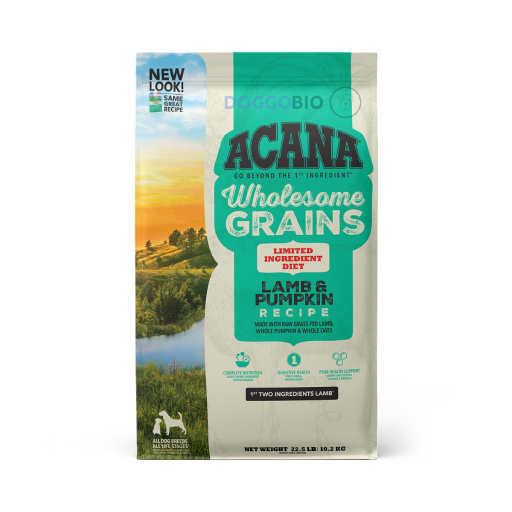
Acana Wholesome Grains Lamb & Pumpkin
Acana provides grain-free options, products tailored by breed size and age, grain-inclusive dry dog food, specialized formulas for weight management, sensitive tummies, and high protein and poultry-free diets.
Pros
Rich in animal protein content
Offers novel protein sources such as lamb and duck
Cons
It contains filler ingredients like oat groats, oats, sorghum, and sunflower oil.
Dry food may not be as easily digestible for most dogs as wet food.
Acana offers a range of cooked and raw options, with a minimum of 50% animal ingredients in their formulations. They strive to balance by incorporating fruits, vegetables, and essential nutrients. Flavors include lamb with apple, pork with squash, and duck with pear.
How to Choose the Best Limited Ingredient Dog Food?
1. Single Protein Source: Look for a primary, high-quality protein source, whether chicken, lamb, fish, or another protein prominently listed as the main ingredient.
2. Fewer Ingredients: Ensure the diet has a reduced ingredient list, minimizing potential allergens and making it easier to identify any triggering ingredients.
3. No Fillers or Additives: Opt for a quality LID free from unnecessary fillers like corn, soy, or wheat, and avoid foods with artificial colors, flavors, or preservatives.
4. Whole Foods: Even with fewer ingredients, prioritize high-quality, recognizable whole foods such as sweet potatoes, peas, or carrots.
5. Vitamins and Minerals: Confirm the LID meets essential nutritional requirements with necessary vitamins and minerals for a balanced diet.
6. Omega Fatty Acids: Look for foods incorporating fish or flaxseed to provide essential omega fatty acids and coat health.
7. Easily Digestible: Ingredients like pumpkin can indicate ease of digestion, contributing both nutritionally and to digestive health.
8. Transparency in Labeling: Ensure brands list every ingredient without ambiguity, allowing pet owners to know precisely what they’re feeding their pets.
9. Hypoallergenic Properties: For allergy concerns, prioritize products that emphasize hypoallergenic properties and are devoid of common allergens.
10. Recommendations and Reviews: Seek recommendations, read reviews, and consult your veterinarian for tailored advice based on your dog’s specific needs and reactions to LID foods.
Frequently Ask Question
Why Choose Limited-Ingredient Dog Foods?
Limited-ingredient dog foods aim to streamline ingredients, primarily to lessen potential allergens and enhance digestibility. They’re particularly advantageous for dogs with food sensitivities or allergies, aiding owners in pinpointing and eliminating problematic ingredients.
Are Limited Ingredient Diets only for dogs with allergies, or can all dogs benefit?
Initially tailored for dogs with food sensitivities, LID can benefit all dogs. Owners often favor them for their simple ingredient lists, ensuring their pets consume only essential elements and minimizing exposure to fillers and potential irritants.
Transition gradually over a week. Begin by blending a small portion of the LID with their current food, gradually increasing the LID portion daily. This method aids in minimizing digestive disturbances.
Will my dog receive adequate nutrients from a Limited Ingredient Diet (LID)?
Top-notch LID foods are crafted to deliver comprehensive and balanced nutrition, fulfilling dogs’ essential requirements. Ensure the food meets AAFCO standards for your dog’s life stage.
Can puppies consume a limited-ingredient diet?
Yes, puppies can partake in LID; however, ensure the formula is tailored to their needs. Growing dogs have distinct nutritional requirements; thus, they should opt for an LID labeled suitable for growth or all life stages.
Do limited-ingredient foods solely feature one protein source?
Usually, LID concentrates on a singular protein source to streamline the formula, aiding in identifying potential allergens. This is particularly advantageous for dogs with particular protein sensitivities.
Are grain-free diets and LID synonymous?
Only sometimes. Although numerous LID foods are grain-free, the main objective of LID is to minimize the overall ingredient list. Certain LID foods may still incorporate select grains known for their digestibility.
Can limited-ingredient foods aid digestive issues?
Yes, LID often supports dogs with sensitive stomachs by featuring easily digestible ingredients and eliminating common irritants, facilitating smoother digestion.
For more, you can explore The Doggo Bio’s comprehensive guide to the best foods for sensitive stomachs.
How do I ensure the quality of an LID?
Verify transparent labeling, confirm a high-quality protein as the primary ingredient, and ensure the absence of artificial fillers or additives. Consulting reviews and seeking veterinarian recommendations can further assist in your decision-making process.
Conclusion
The exploration of limited ingredient dog foods highlights the significance of prioritizing quality over quantity. By emphasizing vital nutrients and eliminating unnecessary components, these diets provide a straightforward route to balanced nutrition, especially beneficial for dogs with allergies or digestive concerns.
As you contemplate shifting to such a diet, consulting your veterinarian is essential to ensure it suits your dog’s health requirements. Ultimately, in the realm of dog nutrition, simplicity often proves to be superior.
